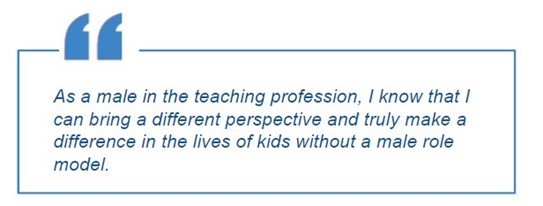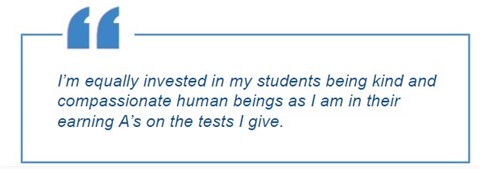Should There Be More Male Teachers in Elementary Classrooms? If They’re Like This NJ Teacher, Yes!

Miguel Ruiz teaches elementary school in New Jersey and describes teaching as a calling.
He explains, “I teach because I love working with kids. I feel as if this is the job I was born to do.”
He uses his influence as a teacher to help shape his students’ character, stating, “I’m equally invested in my students being kind and compassionate human beings as I am in their earning A’s on the tests I give.”
Miguel is one of a small percentage of male teachers making a difference in elementary schools nationally. He’s part of an even smaller percentage of Hispanic males (2%) doing so.
There is no shortage of research examining the importance of having a racially diverse workforce in schools. The results of countless studies showing social and academic gains for students taught by teachers from diverse backgrounds have compelled districts nationally to intentionally recruit more Black, Hispanic and Asian teacher candidates. But what does the research say about male teachers in schools--specifically those like Miguel who teach at the elementary level?
While the research in this area is limited, there is evidence that male teachers have tremendously positive effects on young learners. For example, one study found that male teachers were more likely to be seen as role models by boys and that they could help to close the achievement gap between boys and girls. Additionally, male teachers may help break stereotypical perceptions of young minds about teaching careers, making it possible for all students to envision themselves as elementary school teachers regardless of gender. Despite these potential benefits, the shortage of male teachers in elementary schools has been a prevalent and concerning trend in recent years. According to the National Center for Education Statistics (NCES), male teachers accounted for only 11% of all elementary teachers in public schools in 2017-2018.

The findings from the latest cohort of elementary school teachers at Rutgers Alternate Route are encouraging, although it highlights the need for more efforts to recruit and retain male teachers. Almost 20 percent (19.5%) of all elementary school teachers are male, which is higher than the national average. The data confirms the existence of a gender imbalance in elementary school teaching, with significantly more female teachers (95) compared to male teachers (23).
The findings also align with historical trends in the education sector, where female teachers have been more prevalent in the elementary education field. Nevertheless, it demonstrates that there are males who, like Miguel, choose careers as elementary school teachers and reject the idea that that teaching young children is a woman’s job.
A sports management major and former bartender, Miguel recognizes that he is one of a small percentage of males in the teaching profession. He also understands the value that his career choice brings to his students. He explains, “As a male in the teaching profession, I know that I can bring a different perspective and truly make a difference in the lives of kids without a male role model. My kids spend about as much, if not more time in my classroom than they do in their own home; so, it is my duty and my honor to serve as a role model for them.” Miguel’s commitment is not just to his class, he makes himself accessible to the entire school community, noting, “Aside from the kids in my class, I try to establish relationships with other children in the school, which is an incredibly rewarding experience.”

It’s as if Miguel has read the research that including male teachers in elementary school settings can foster a more balanced and comprehensive learning environment. His practices appear to confirm study findings that the presence of male educators contributes to a more holistic approach to nurturing young students, offering diverse perspectives and valuable mentorship for both boys and girls, fostering empathy, and promoting a sense of belonging for all children. By simply choosing a career field with an underrepresentation of males, Miguel is also helping to break down gender stereotypes, and promoting gender equity from an early age—another important research highlight.
So, how can more males follow Miguel’s example and help change the gender demographics of the staff room in elementary schools? Aspiring male teachers with a college degree can explore alternative certification, the pathway teaching Miguel used. The New Jersey Department of Education offers an Alternative Teaching Licensure process for career changers, recent college graduates and substitute teachers who wish to launch careers in education. This fast-tracked teacher certification process helps those who wish to become certified teachers in New Jersey but have not completed a teacher preparation program at a college or university. Candidates are hired as full-time teachers and earn a teacher’s salary with benefits while they teach during the day and complete certification coursework during evenings and weekends.
Teaching can be a rewarding career path for anyone, including men. Miguel has clearly experienced the rewards, “I feel very fortunate that I’m able to do this work and I do not consider it a job.”
If you’re considering following your dream of teaching, Rutgers Alternate Route can offer you the support and training you need to succeed. Be sure to follow Rutgers Alternate Route on Twitter or sign up for Alternate Route’s monthly newsletter for more information and stories from the field of education.

 Heather Ngoma has over 25 years of experience collaborating with educators across New Jersey to drive education innovation. She currently serves as the Director of the Rutgers-GSE Alternate Route Program in the Department of Learning and Teaching, a program which helps career changers, recent college graduates, and other aspiring education professionals become licensed teachers in New Jersey. Follow her on Twitter @heatherngoma.
Heather Ngoma has over 25 years of experience collaborating with educators across New Jersey to drive education innovation. She currently serves as the Director of the Rutgers-GSE Alternate Route Program in the Department of Learning and Teaching, a program which helps career changers, recent college graduates, and other aspiring education professionals become licensed teachers in New Jersey. Follow her on Twitter @heatherngoma.





